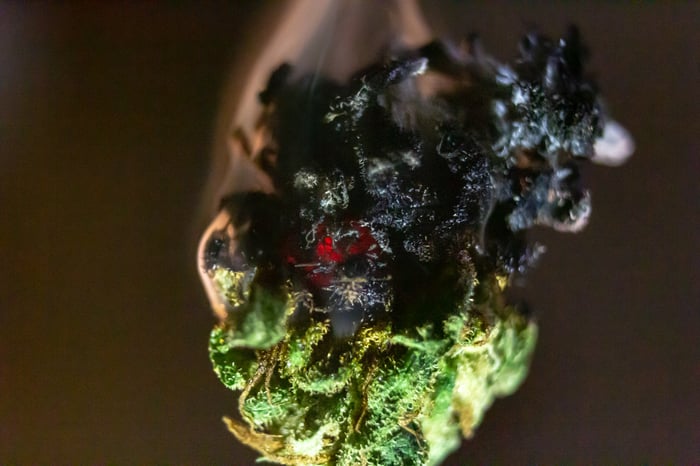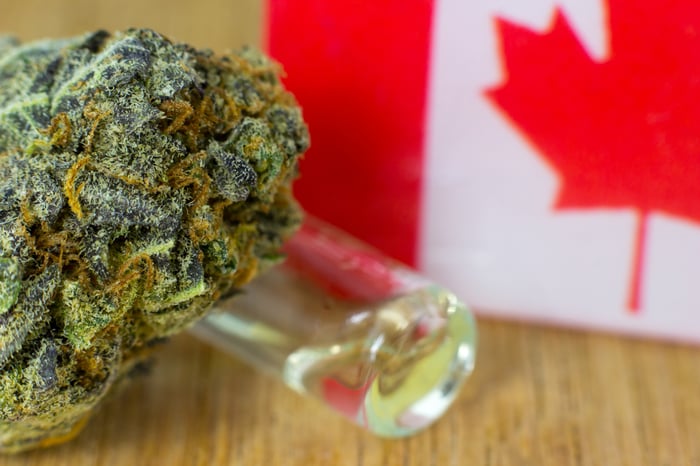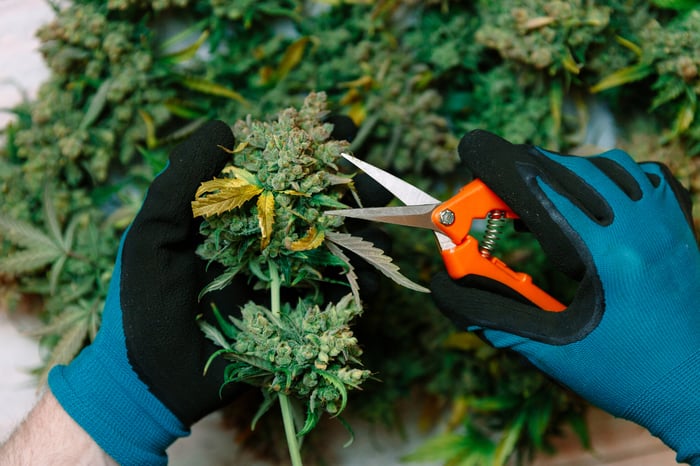There's a very good chance that legal cannabis could be one of the decade's most impressive growth trends.
According to New Frontier Data, the U.S. weed market is on track to grow by an annualized average of 21% through 2025. This would place annual pot sales at north of $41 billion by mid-decade. Meanwhile, cannabis-focused analytics company BDSA expects Canadian weed sales to more than double from $2.6 billion to $6.4 billion between 2020 and 2026. There's plenty of room in these robust growth projections for certain marijuana stocks to thrive.
However, not all pot stocks are going to be winners. Among the veritable sea of fast-growing cannabis stocks are three that should be avoided like the plague in September.

Image source: Getty Images.
Sundial Growers
In March, I effectively referred to Sundial Growers (SNDL -3.38%) as the worst cannabis stock money could buy. Even with the company's share price being halved since that declaration, I still believe Sundial is one of the worst ways to put your money to work in the cannabis space.
Sundial has one thing going for it: cash. Management turned on the capital-raising faucet in October 2020 and hasn't shut the valve off since. As of early August, the company was sitting on approximately 1.2 billion Canadian dollars ($953 million) in cash, marketable securities, and long-term investments. With no debt, the concerns of bankruptcy are long gone. Unfortunately, this bountiful cash pile is where the good news ends.
The only way Sundial has been able to raise capital is buy issuing stock -- a lot of stock. In the nine months between Sept. 30, 2020 and June 30, 2020, Sundial's share count ballooned from 509 million to 2 billion. All the while, longtime shareholders have been pummeled by this incessant dilution. With the company's share price stuck below $1, a reverse split will potentially be necessary to avoid delisting from the Nasdaq exchange.
What makes this ongoing capital-raising activity especially maddening is that management isn't exactly certain what it's going to do with all of this cash. It's made an acquisition and has sort of become a cannabis-focused special purpose acquisition company. But continuing to raise cash without any concrete plan is a slap in the face to the company's shareholders.
If you need another good reason to avoid Sundial, consider that its sales have headed in reverse as Canadian weed revenue expands. Switching from wholesale to retail meant rebuilding its business from the ground up. Through the first half of 2021, Sundial has generated only $19.5 million in gross cannabis revenue, which is down 40% from the comparable year-ago period.
With the exception of its cash, Sundial has nothing going for it.

Image source: Getty Images.
Hexo
Another Canadian pot stock that's absolutely raking its shareholders over the coals and deserves to be avoided like the plague is Quebec-based Hexo (HEXO).
When Canada legalized recreational marijuana in October 2018, I truly thought Hexo was going to be a winner. The company had formed a joint venture (known as Truss) with Molson Coors Beverage to create a line of cannabinoid-infused beverages. It also secured a five-year wholesale agreement for an aggregate of 200,000 kilos of cannabis from its home province of Quebec. However, time has shown that nothing is a given in the investment world.
Aside from federal and provincial-level regulatory miscues that have delayed the opening of dispensaries in key Canadian provinces (ahem, Ontario), Hexo's biggest issue has been its acquisition-happy management team. For example, Hexo grossly overpaid for its Newstrike Brands buyout in 2019. While this purchase was designed to expand its production capacity, this added output was never necessary. Eventually, Newstrike's cultivation facility was sold for pennies on the dollar and Hexo took a significant writedown.
What's Hexo done in the two years since this ill-timed purchase? You guessed it: Made more acquisitions with capital it simply doesn't have. It acquired the struggling Zenabis Global by issuing stock, has nearly closed the purchase of 48North Cannabis, which is an all-stock deal, and issued tens of millions of new shares to acquire Redecan, Canada's largest private licensed producer. While I will note that Redecan is profitable on an operating basis, Hexo's track record has always been to grossly overpay for assets that it can't afford.
Taking into account the company's 1-for-4 reverse split that was enacted in December to avoid a possible delisting for a low share price, Hexo's outstanding share count has surged from a little over 60 million two years ago to over 201 million today.
With a persistent cash outflow, there's simply no reason for investors to gamble on Hexo when so many other great names are worthy of investment in the cannabis space.

Image source: Getty Images.
Aurora Cannabis
You didn't think I'd forgotten about Aurora Cannabis (ACB -2.96%), did you? Sundial might be one of the worst-run companies in the pot industry, but Aurora Cannabis has long been a fixture of this monthly column of pot stocks to avoid.
Similar to Hexo, Aurora Cannabis looked as if it was set for success when the green flag waved in Canada. It had 15 production facilities and was projected to be the world's largest producer of weed, with over 600,000 kilos a year, when fully operational. But just like Hexo, management was too overzealous with its production expectations and wildly overpaid for roughly a dozen acquisitions.
How badly did Aurora overpay? After accounting for tangible and intangible assets, the "premium" one company pays for another is recorded as goodwill on its balance sheet. By the beginning of calendar year 2020, Aurora was carrying CA$3.17 billion in goodwill. A significant portion of this goodwill has since been written down, with half of Aurora's total assets (about CA$2.8 billion) whittling away since the beginning of 2020.
Like Sundial and Hexo, Aurora Cannabis is a serial share diluter. In close to a seven-year stretch between June 2014 and May 2021, Aurora's outstanding share count rocketed from around 1.3 million shares to about 198 million shares. With the company still not generating positive cash flow from its operations, ongoing share-based dilution remains a constant threat to its investors.
And that brings me to the final point: Aurora's ghastly operating performance. Even with aggressive cost-cutting, production facility closures, and asset sales, Aurora's push to positive earnings before interest, taxes, depreciation, and amortization (EBITDA) keeps getting kicked further down the line. That's a problem considering the company's debt is tied to covenants requiring it to hit positive EBITDA.
Aurora was a catchy name early on in the cannabis movement, but it's clear-cut proof that being first doesn't always mean a company will be a long-term winner.





